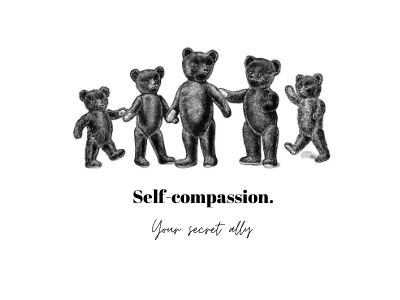SELF-COMPASSION. HAVE SOME.
Imagine you have a wonderful tool, that helps you in your journey towards a better life anytime you need it.
You wake up quietly energized, and calmly get on with the things you want to accomplish. You have an idea of where it is you’re headed and simply do the next thing on the list, take the next steps towards your goal.
There is this serene feeling washing over you – some of the things you need to do excite you, others maybe not so much, but you do them with equal ease.
There is no inner struggle; you cannot hear the whip whipping in your mind. It feels… effortless.
You know you’ll do what you can, which sometimes means a lot, and another time – maybe less. But there’s no room for self-loathing, any guilt trips, or shaming because you know you have the best tool in your arsenal – a healthy dose of self-compassion.
LET SELF-COMPASSION BE YOUR COMPASS.
What is self-compassion and what is not?
Self-compassion is not self-indulgence. It does not mean that by acknowledging your own struggle you can replace work with instant gratification because you ‚deserve some fun’. Self-indulgence hurts you; self-compassion strengthens you.
Self-compassion is not self-pity either; you are not there to perceive yourself as a victim of life circumstances. It is what it is, not always perfect, not always easy, but you embrace it and focus on what is within your control. Self-pity hurts you; self-compassion strengthens you.
So, what is it then?
As Kirstin Neff puts it:
**”**Self-compassion entails being warm and understanding toward ourselves when we suffer, fail, or feel inadequate, rather than ignoring our pain or flagellating ourselves with self-criticism. … When this reality is denied or fought against suffering increases in the form of stress, frustration, and self-criticism.”*
‚I’m lazy”. “I procrastinate.”, “I’m hopeless.”, “I’m worthless.” ‘I’m a shitty person.” – I’m not saying you’re not. But if you’re reading this, chances are, you really do want to change.
Simply acknowledging the fact that things and life (even due to your own doing) can sometimes be really hard is, well, hard – and an act of courage!
Why do so many of us resist self-compassion?
I think many of us are afraid of self-compassion – like if we get there, we will stop even trying, we’ll lose our drive.
In a world obsessed with productivity and achievement over alignment and purpose, self-compassion may seem like a dangerous tool to many of us.
After all, if we spend so much time resisting things, fighting our urges and cravings, disciplining our minds, won’t this self-compassion mess us up even further?
Won’t self-compassion undermine your efforts to get disciplined?
Self-indulgence might; self-pity will.
Self-compassion won’t.
If anything, it’s the opposite. By acknowledging our own conditions and struggles, by showing ourselves some kindness, we boost our resilience. And boy, don’t we need some to fight those dragons!
Why is self-compassion a good thing?
It lowers your anxiety and potential depression.
It gives you more resilience – the fuel you need to face life’s challenges.
Especially in managing different ailments like procrastination (or addictions), adding more negative self-talk to the mix can only worsen things.
NON-JUDGEMENTAL SELF-REFLECTION
This is not to say we shouldn’t reflect on our actions and course-correct.
I’m a huge fan of a regular self-reflection (the art of HANSEI) but in a more scientific rather than judgemental way:
- this works,
- this doesn’t;
- this needs tweaking.
But if you attach judgment and negative self-talk, you will only dig the hole you’re trying to escape deeper. And that ain’t helping anyone, you included.
SELF-COMPASSION IS NOT FOR THE FAINT-HEARTED
I see a lot of unnecessary suffering, frustration, and hopelessness. And it just saddens me greatly, because many people are so fixated on the wall in front of them, they don’t really see that the wall is only 1 meter wide, and could be easily bypassed on either side.
Deep, lasting change is not easy, but it can be a little easier if you show yourself some basic kindness.
Treat your mistakes as a guide, forgive yourself, and move past them.
Instead of whipping yourself, just acknowledge that for whatever reason, you are where you are, and you can start building from there.
If you find any of the ideas, tools, and reflections useful, please subscribe to never miss another nugget of wisdom 🙂


